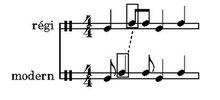Manele
Similar music styles are also present in other Balkan areas, such as Bulgaria, Serbia, Montenegro, Albania, Bosnia, Greece and Turkey and with expatriates and emigrants originally from these regions.
[2] The genre has been rocked by accusations of plagiarism a number of times, with manele singers adapting popular songs from Greece, Bulgaria, Serbia and Turkey, without giving due credit.
Manele is a mixture of "oriental" Romanian folk and contemporary pop music with bases on Balkan influences The lyrics usually refer to themes of love, enemies, money, alcoholism and difficulties of life in general, or some of the songs are specifically dedicated to parties, weddings, funerals, etc.
Manele are widely criticized for their lyrical content, which often consists of boasts about the singer's supposed sex appeal, intellect, wealth, social status, and superiority over so-called "enemies".
Manele are a strongly disputed genre in Romania, with many representatives of Romanian upper-middle and intellectual class opposing this "musical" movement (and its popularization) mostly because of its usage of faulty grammar, overly simplistic or childish lyrics and subject matter and/or encouragement of demeaning behaviours towards other people, as well as an antisocial overall message.
In the media, manele have been repeatedly called by journalists and academics (such as the literary critic George Pruteanu) "pseudo-music",[3] "pure stupidity, inculture and blah-blah" or even "society's bed-wetter".
[3] Romani-Romanian classical musician and politician Mădălin Voicu distinguishes between the original genre and today's interpreters, calling their work "kitsch and bad taste", "bad merchandise, easy to sing, and only sold to fools at a high price", but considers them to be "harmful", "simple music and brain damaging", "a representation of the lack of musical culture in society" and "a fad that is poised to vanish in the future".
[9] Romanian-American professor Cezar Giosan further compares the genre in an article in Dilema Veche with the early stages of rock-and-roll (and Elvis), early rap and reggaeton, music starting out from the outcast classes of society, being shunned by the higher classes for the simple reason of its origin, only to explode into mainstream later on.
[10] The same professor considers the genre as being a form of originality coming from below, with the singers having a genuine (albeit rough and uneducated) talent in music, with the lyrics being just a reflection of basic, simple human needs.
[10] In a similar vein, Sorin Adam Matei, an associate professor of communication at Purdue University, US, affirmed in an opinion piece for Evenimentul Zilei that manele are a creole genre, a simple, but lively music, spawned by the meeting of many cultures, that has a chance to succeed as a cultural style if it is polished and "cleaned up".
[15][16] Popular performers include Florin Salam, Nicolae Guță, Vali Vijelie, Sandu Ciorba, Tzanca Uraganu, Costel Biju, and DeSanto.
